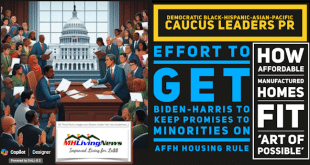Affordable quality housing is one of the most critical issues of our time. So too is affordable home ownership, which should be the ideal goal over rental housing. A challenge is zoning and land use, which is highly politicized, and thus is often misunderstood.
What follows is adapted from the comments letter addressed as shown below. This features a video interview with the Donald Tye, Jr. who is actively retired from both business and ministry. Tye’s story is a real-world example of how affordable factory-built homes could be the key that unlocks the log jam, but it must be properly understood.
Part of that key is that manufactured homes have by law something known as “enhanced preemption.” It is little known, and thus not used often. But if used, it could open the doors for home ownership for many.
Tye’s video interview will raise that topic, sent in the context of his own family’s story. With that introduction, let’s dive into the video, which is followed by an adaptation of the comments that relate to Tye’s story.
10.15.2018
Dear Secretary Ben Carson, M.D.
HUD General Counsel and
All Other HUD Officials Involved in the AFFH Process,
Re: Advance Notice of Proposed Rulemaking
Affirmatively Furthering Fair Housing (AFFH): Streamlining and
Enhancements, Docket No. FR-6123-A-01; RIN 2529-AA97
Executive Summary:
It’s the truth, hiding in plain sight.
The proper implementation of existing laws could rapidly accomplish several things relevant to the Affirmatively Furthering Fair Housing (AFFH) discussion. They would include, but not be limited to, the following:
· Taxpayer dollars could be saved,
· more local, state and federal tax revenues would be generated,
· the personal net worth (wealth) of millions of Americans could be advanced over time,
· Those NIMBYite voices could be won over to YIMBY via practical, evidence-based educational efforts.
The proposal that follows would use principles already embraced and advocated by President Donald J. Trump, Vice President Mike Pence, HUD Secretary Ben Carson, M.D., and others. But the proposal itself is unique and simple, as you will see.
For clarity for readers who don’t already know, NIMBY is an acronym that means “not in my back yard.” YIMBY is its reverse, “yes, in my back yard.” The two poles reveal the tension between those who want to block all development near them vs. those who are open to building housing in a more robust fashion.
The solution for the affordable housing crisis and for an effective path to properly implement AFFH begin at a surprisingly similar nexus.
The video interview on the page below could be viewed before and/or after reading the prologue that follows, because the two are bookends and are interconnected.


The Rev. Donald Tye, Jr. told us about his parents They began with conventional construction, but that proved to be too costly for many prospective buyers. So, Tye Junior’s father turned to factory-built homes, constructed in the early 1970s, prior to the HUD Code for manufactured homes.
Those homes were installed in a neighborhood that included conventional housing.
Those factory-built homes reportedly sold well. They appreciated in value, side-by-side with conventional housing. There was federally guaranteed financing available that made the homes easy to buy for those seeking their part of the American Dream of home ownership. Tye says they are worth many times more than when they were first sold, per data from Zillow.
Rev. Tye told MHProNews that the buyers, seller – essentially everyone in the mix – were benefiting. That was true until the ‘city fathers’ – local politicos – shut the blossoming private-sector effort down. Once the powers-that-be decided against them, no more of those factory-built homes could be placed. Tye touches upon that in a video interview that we did with him, that will be posted above.
Tye’s parents and those who bought those homes – including Tye himself – saved on housing costs. That savings allowed he and his wife to pay off that factory-built home years early.
Owning that home outright in turn allowed Tye and his wife – a school teacher – to open a business, put their children into good schools, and help their offspring get a good education. Tye later invested in other real estate. Having worked with his parents, Tye saw both conventional construction and factory-built construction. He inspected housing that he was considering investing in. Tye said some of the site-built housing he examined wasn’t as well built as those factory-built home he owned, and that his father sold.
Chance Encounter
My wife and I had met the Tyes quite by chance at a dentist’s office. We began to talk, and we hit it off.
My wife and I learned some of the above about their experiences during a meal we subsequently had with Donald. We initially had no idea that he and his wife owned a factory-built home, or other kinds of property. Our involvement was social.
But during a breakfast, Donald was conversationally sharing his concerns that people working for $15 an hour couldn’t buy a new conventional house. But he said they could buy a factory-built – today’s manufactured home – much like his parents, his wife’s family, and later he and his wife had all done.
Donald gave us his okay to share his story on MHProNews and MHLivingNews. We subsequently sat with him, and did the video interview referenced above. We said at the time, the Tye family was a living example of all the research and writing that we’ve done for years in advocating for a broader use of modern manufactured homes, including in urban or suburban environments.
Don’s story drew industry-wide attention, and some potent comments, like those linked below. These relate to the Manufactured Housing Improvement Act of 2000, discrimination against manufactured housing, and are thus relevant to this discussion of AFFH.
Here are some subsequent comments by Tye himself.
In the wake of the troubling events in Charlottesville last year, Rev. Tye and I agreed to do some comments about discrimination and how a just society ought to function, which also bears consideration in this AFFH discussion. That article is linked below. It would be my hunch that HUD Secretary Ben Carson, M.D. – among many others – would find these of interest.
“Seek First” a Post-Charlottesville Message of Healing and Principles for America
Why? Because Secretary Carson said several times last year (2017) that the average home owner has a $200,000 net worth, while the average renter has a $5,000 net worth.
There are studies done by third-party researchers that debunk the kind of fallacies that people have about factory-built, or more specifically, HUD Code manufactured homes.
But before we leave the story of the Tye family behind for now, let me draw your attention to the pull quotes and illustrations from Donald.
In written comments, Rev. Tye excoriated “housing projects” that “warehouse” people “like cattle.” He said a far better option for the vast majority would be the broad use of manufactured homes. Tye specifically cited the project below as an example of how such public housing projects often failed, and had huge costs.
http://www.mhmarketingsalesmanagement.com/blogs/daily-business-news/manufactured-housing-regulatory-other-roadblocks-and-potential-solutions-up-for-growth-research-plus-urban-institute-report-revisited/
Now let me draw your attention to a quote from my wife, Soheyla that applies. Like you, Dr. Carson, my wife is an MD. Life circumstances – health challenges that began before the birth of our son, Tamas – forced her to set her career aside, to care for him full time for several years. Due to circumstances, she shifted her career focus and worked with me on several levels, while she simultaneously cared for our son. Like myself, Soheyla grew up in housing that used conventional, on site construction. But we later lived as a family in several manufactured homes and communities over the course of many years.
So, we have a broad set of experiences that makes my comments here relevant to the discussion of AFFH. With that backdrop, here is an apt observation my wife made.
Nothing is changed until it is challenged. The status quo needs to be challenged.
But their are tremendous rewards for most everyone in the mix once that status quo is challenged.
Using existing laws – the Manufactured Housing Improvement Act of 2000, plus laws on the books that mandate federal financing support for manufactured homes – there could be a rebirth of affordable home ownership in America. Because the laws are already on the books, it could happen “quickly” as President Trump likes to say. ## (Lifestyle, news, human interest, flashback, affordable housing news, analysis, and commentary.)
(See related reports, linked below. Any third-party images and content are provided under fair use guidelines. All rights reserved. ©

Related Reports:
 manufacturedhomelivingnews.com Manufactured Home Living News
manufacturedhomelivingnews.com Manufactured Home Living News






































